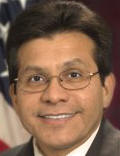|
1/18. The
Senate Judiciary Committee (SJC) held a hearing titled "Oversight of the
U.S. Department of Justice". The witness was Attorney General
Alberto Gonzales.
The Department of Justice (DOJ) released
two statements. First, there is Gonzales'
long
statement, which is twenty numbered pages when printed on paper. He did not
read this at the hearing. Second, there is Gonzales'
short
statement, which reflects his opening remarks.
Terrorist Surveillance Program.
Sen. Patrick Leahy (D-VT), the Chairman of the SJC),
Sen. Arlen Specter (R-PA), the ranking
Republican, and many of the Democrats on the Committee praised the Bush
administration's announcement on January 17, 2006, that it would not renew the
Terrorist Surveillance Program (TSP).
The Bush administration announced that the National
Security Agency (NSA) will henceforth obtain approval from the
Foreign Intelligence Surveillance Court (FISC) to conduct terrorism related electronic
surveillance where one party is in the U.S. and one party is outside of the U.S.
See, January 17
letter [PDF]
from the DOJ to the U.S. Court of Appeals
(6thCir) , and story titled "NSA to Obtain FISA Authority for Disputed Electronic
Surveillance" in TLJ Daily E-Mail Alert No. 1,521, January 17, 2007.
At the January 18 hearing, Gonzales wrote in his short statement that "Court orders
issued last week by a Judge of the Foreign Intelligence Surveillance Court will enable the
government to conduct electronic surveillance -- very specifically, surveillance into or
out of the United States where there is probable cause to believe that one of the
communicants is a member or agent of al Qaeda or an associated terrorist organization --
subject to the approval of the FISA Court."
 However, Gonzales (at right)
declined to provide details about the FISC orders. However, Gonzales (at right)
declined to provide details about the FISC orders.
Gonzales' long statement contains a description of the TSP that appears to
have been drafted prior to the January 17 announcement.
Sen. Leahy wrote in his
opening statement, most of which he recited verbatim, that "This reversal is
a good first step, but there are still several outstanding questions that
remain. To ensure the balance necessary to achieve both security and liberty for
our Nation, the President must also fully inform Congress and the American
people about the contours of the Foreign Intelligence Surveillance Court order
authorizing this surveillance program and of the program itself."
Data Retention Mandate. Gonzales wrote in his short statement that "I
continue to hear from federal, state and local law enforcement that they need
access to the information that will help us find online predators and child
pornographers." He also repeated this line in his oral testimony.
Gonzales' long statement contains 14 paragraphs regarding online pornography
and predators. However, it does not contain a request for new legislation.
Sen. Orrin Hatch (R-UT) raised the
subject of child pornography. He first advocated the creation of a new
commission to study the subject "with a particular focus on the internet". He
added that "the internet is part of the problem".
AG Gonzales stated he would like to talk with Sen. Hatch about that. He added
that "we need more resources".
 Sen. Hatch
(at left) also said that "You in the past have expressed the concern that
investigators in child exploitation case sometimes hit dead ends because
internet service providers have not kept data that would help determine the
sources of images posted on the internet. How big a problem is this for law
enforcement? And, is there something that Congress can do to help solve it?" Sen. Hatch
(at left) also said that "You in the past have expressed the concern that
investigators in child exploitation case sometimes hit dead ends because
internet service providers have not kept data that would help determine the
sources of images posted on the internet. How big a problem is this for law
enforcement? And, is there something that Congress can do to help solve it?"
Gonzales responded, "Well it is a problem. You are right. We are engaged, we
have encountered investigations, where the evidence is no longer available,
because, there is no requirement to retain the data. Many ISPs do retain data
for commercial purposes, and let me just say, most ISP companies are great
partners for the law enforcement community, so I want to commend them for their
efforts. However, for those few cases where we need that information, the
question is, how do get, how do we maintain that evidence. And so, for that
reason, I have had discussions with the ISP community, with victims' groups,
with privacy groups, about whether or not it makes sense to have some kind of
legislation to do data retention -- not data retained by the government, but
data retained by ISPs -- that could be accessed with a court order, by the
Department of Justice, from a court judge. And, I think, I would like to have a
discussion with the Congress about that."
The DOJ sought legislation in the 109th Congress that would have imposed data
retention mandates on internet services providers. Gonzales also gave several
speeches on this subject. See for example, April 20, 2006,
speech,
and story
titled "Gonzales Proposes Data Retention Mandate, Web Site Labeling, and Ban on
Deceptive Source Code" in
TLJ Daily E-Mail Alert No.
1,357, April 25, 2006. See also, story titled "Gonzales Says Foreign Governments
Should Have Access to Information Collected under Data Retention Mandate" in
TLJ Daily E-Mail Alert No.
1,365, May 8, 2006.
However, while the DOJ and others are building support for legislation
mandating data warehousing, any bill might have to move through the
House Commerce Committee's (HCC)
Subcommittee on Communications and the Internet. Its Chairman is
Rep. Ed Markey (D-MA). See, story
titled "Rep. Markey Advocates Data Destruction Bill" in
TLJ Daily E-Mail
Alert No. 1,429, August 10, 2006.
On the other hand, Rep. Diana DeGette
(D-CO), a member of the HCC, is a data retention mandate proponent. See, story
titled "House Commerce Committee Considers Data Retention Mandate" in
TLJ Daily E-Mail
Alert No. 1,365, May 8, 2006.
Gonzales' long statement offers a description of the online activities of
pornographers and predators. It states that "the Internet is increasingly used
by sexual predators and abusers as a tool for exploiting and victimizing our
children through both child pornography and cyberenticement."
"The Internet has contributed to a significant increase in the proliferation and
severity of such images. It provides deviants with an easily accessible and seemingly
anonymous means of accumulating and distributing vast collections of images of child sexual
abuse."
It adds that "As the Internet and related technologies have grown and evolved,
children are also increasingly at risk of being sexually solicited online by predators.
Law enforcement is uncovering an escalating number of ``enticement´´ cases, where
perpetrators contact children in chat rooms or through instant messaging and arrange to
meet at a designated location for the purpose of making sexual contact."
Gonzales' long statement also contains some prosecution data. It states that
"In 2006, federal prosecutors charged 1,638 defendants with child pornography or
cyberenticement. Of these, 1,242 were sentenced to prison. This is up from 715
defendants charged in 2000. Over the last ten years, the FBI’s
Innocent Images National Initiative has gone
from 68 defendants charged and convicted as a result of their efforts to 1,018 in
2006."
Internet Drug Sales. Gonzales wrote in his short statement that "I
hope we can discuss an emerging problem -- the abuse of prescription drugs
purchased over the Internet -- and the things we can do together to address this
issue. Prescription drug abuse is now the second largest form of drug abuse in
the United States and the only rising category of abuse among youth. Feeding
this abuse is the proliferation of illicit websites that offer controlled
substances for sale, requiring little more than a cursory online questionnaire
and charging double the normal price. Make no mistake: these illicit websites
are not about getting necessary medicine to those in need."
He added that "We must preserve legitimate access to medications over the Internet
while preventing online drug dealers from using cyberspace as a haven for drug trafficking.
I look forward to working with Congress to ensure that controlled substances are dispensed
over the Internet only for legitimate medical purposes."
He also read this language verbatim at the hearing.
Intellectual Property. Gonzales' long statement reviews recent DOJ
activities to enforce intellectual property rights (IPR). It also contains a
statement regarding legislative proposals for the 110th Congress.
It states that "We will continue to seek legislation that would, among other
things, increase penalties for intellectual property crimes, clarify that registration of
a copyright is not required for a criminal prosecution, make attempts to commit copyright
infringement a crime and increase the tools investigators have at their disposal to track
potential intellectual property crimes."
Other Issues. Sen. Jon Kyl (R-AZ)
praised the DOJ for prosecuting internet gambling cases.
Sen. Leahy, Sen. Specter, and criticized the practice of issuing Presidential
signing statements. Gonzales defended the practice.
Sen. Dianne Feinstein (D-CA)
complained, and asked questions, about the selection process for U.S. Attorneys.
Sen. Charles Grassley (R-IA) wrote
in his opening statement that he wants "assurances that the Department of
Justice is doing all it can to enforce antitrust laws". However, while he wrote
that the DOJ's Antitrust Division should
be "pro-active" in all industries, his main concern is agribusiness
consolidation.
Several members raised the subjects of habeas corpus, sentencing guidelines,
rendition, the anthrax investigation, and/or violent crime.
Some members of the SJC, such as Sen. Ted
Kennedy (D-MA), focused on issues largely unrelated to the jurisdiction of the SJC,
such as going to war with Iran. Gonzales said that he was unaware of any plans to go
to war with Iran.
Richard Hertling and William Moschella sat immediately behind AG Gonzales at the
hearing.
|